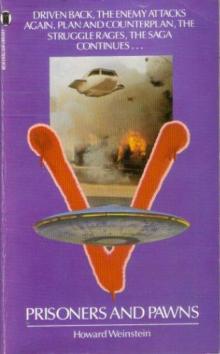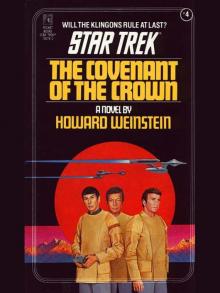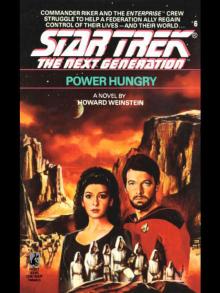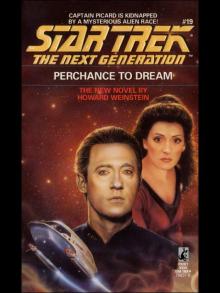- Home
- Howard Weinstein
POWER HUNGRY Page 2
POWER HUNGRY Read online
Page 2
“What is it, Number One?”
“Sensors picking up some activity at extreme range. I thought you’d want to know.”
“I’ll be right there.”
The captain strode onto the bridge, glancing at his regular staff at their posts—Riker and Troi seated on either side of his command chair in the center well; Lieutenant Worf, the Klingon security chief, at his tactical panel on the horseshoe-shaped upper deck; Data and young Wesley Crusher at the forward Operations and Control stations.
As he started to sit, Picard noticed a less familiar face attending the Mission Operations monitors directly behind Worf. She was young, with auburn hair and a sprinkling of freckles spilling across her nose. Lieutenant White, he remembered, sliding into his contoured seat. He inclined his chin toward the viewscreen. “What’s out there, Number One?”
“I can’t tell for certain, sir. Three or four small ships at the limit of our sensor range.”
“Any discernible heading?”
“Not since we picked them up. We’ve been transmitting standard hailing messages—no response.”
“Captain,” Data broke in, “two ships are now moving evasively but in our general direction.”
“Mr. Worf,” said Picard, “still no response to our hails?”
“Negative, sir. Recommend defensive posture—shields up, weapons on standby.”
“Agreed. Make it so. Mr. Data, tactical display on main viewer.”
A grid replaced the starfield on the bridge screen. The Enterprise and her five cargo carriers appeared on the left side of the grid. Two fast-moving blips were approaching from the right.
The pair of spacecraft closing on the big starship were slender projectiles, dark, fierce, and anonymous in their simplicity, without muscular bulges or bristling weapons. Their elemental design hinted at singleness of purpose. They were killers.
Without slowing, they split apart and veered around the Enterprise, one to either side, then suddenly cut and crossed, unleashing a pair of torpedoes at one of the trailing cargo ships. The burning blue streaks found their mark and the freight drone exploded in a puff of shimmering shards.
Picard gripped his armrests as he watched the destruction on the viewscreen. “Damn. Position of intruders?”
Data scanned his console. “Retreating at . . . warp eleven.” His eyebrows rose in surprise at the speed—faster than the Enterprise could manage.
The aft turbolift snapped open and Geordi LaForge burst onto the bridge.
“Mr. LaForge,” said Picard, “I thought you were off duty.”
“The chief engineer’s never off duty, Captain,” LaForge replied, activating the bridge engineering console.
Picard and Riker exchanged a meaningful look. Geordi’s unexpected appearance at a critical moment was another indication that his promotion to chief engineer was more than deserved.
“Mr. LaForge,” Picard said, “I do not want to lose another freight drone. Can we extend our shields to protect them?”
LaForge’s compact form tensed as he checked his readouts. “In this formation, it’ll be tough, Captain. We can do it, but not without a serious drain on overall available power.”
“Then tighten the convoy. Make sure Mr. Worf has enough power for phasers.” Picard faced forward again. “Mr. Data, have you identified the intruders?”
“Yes, sir. They are Nuaran interceptors.”
“Captain,” Worf said, “Nuarans are among the most effective warriors in the galaxy.”
“And the slimiest,” Geordi added. “Even the Ferengi won’t deal with them. What are they doing out here?”
Riker stroked his beard. “Maybe the Thiopans can tell us.”
“Maybe we can find out ourselves.” Picard swiveled halfway around in his chair. “Mr. Worf, hailing frequencies.”
“Open, sir.”
“Attention, Nuaran spacecraft—this is the U.S.S. Enterprise. We are on a non-hostile mission. We request contact to discuss your unwarranted destruction of a Federation cargo vessel.” Picard’s voice was calm, almost soft.
He waited almost a full minute without getting a response before speaking again.
“Repeat, Nuaran spacecraft—this is the U.S.S. Enterprise. We are on a non-hostile mission—but if you interfere, we will take defensive action.”
He knew perfectly well the Nuaran ships were within reception range. Most likely they thought very little of his warning. After all, he had allowed them to pick off a cargo carrier without firing a return shot. But he would not do so again. “Mr. Worf, your assessment. Do two Nuaran interceptors pose a danger to this ship?”
“Not likely, sir. Not as long as we’ve got full shields.”
Data glanced back over his shoulder. “What about three? That is the number now on an intercept course.”
Picard’s jaw muscles tightened. “I think we’ve given them sufficient time to reply to our messages. Number One?”
Riker nodded. “Concur, Captain.”
“Mr. Worf, fire across their flight path, close enough to make it clear we’ll tolerate no further interference.”
“Understood,” the Klingon security chief said.
“Tracking lock engaged.”
The Nuaran ships hurtled toward the Enterprise, twisting and twirling in an intricate set of evasive course changes. Again they fired torpedoes—and this time Worf reacted with a precise phaser burst. The intruders tumbled away, desperately trying to avoid being hit. All three recovered and fled out of phaser range.
“I think we made our point,” Picard said. “Mr. Crusher, resume heading for Thiopa. Data, keep sensors on maximum range. If the Nuarans pay us another visit, I want to know about it.”
“Dr. Pulaski to Captain Picard.” The voice of Picard’s chief medical officer came over the speaker.
“Yes, Doctor. What is it?”
“I have a very impatient ambassador cooling his heels in my outer office.”
Picard and Riker looked at each other. “We were supposed to meet with him fifteen minutes ago,” Riker murmured.
“Why is he in your office, Doctor?” asked Picard.
“He couldn’t get through to you on the bridge, so he buttonholed the nearest officer he could find—who happened to be me.”
“Give my apologies to Mr. Undrun and escort him to the bridge conference lounge, please.”
There was a pause at Pulaski’s end, and Picard could almost see that look, that patented Katherine Pulaski expression of displeasure when something went against her grain.
“What is it you’re not telling me, Doctor?” Picard asked.
“You haven’t met Ambassador Undrun yet, I take it.” It was a statement, not a query.
“No, I haven’t. Is there something I should know about him?”
“How shall I put this? He has what my grandmother used to refer to as a vexatious personality.”
“Thank you for the warning. Report with him to the bridge conference lounge, Doctor.”
“We’re on our way.”
Picard, Riker, and Counselor Troi stood and moved to the adjoining lounge, with its long table and high-backed chairs. “Number One,” Picard said as they sat, “you’ve dealt with Ambassador Undrun since he came aboard. Is he that much of an irritant?”
“I agree with Dr. Pulaski’s grandmother. ‘Vexatious’ is a suitable word. Consider yourself lucky you’ve been spared up till now, sir.”
When the door opened, the pair who entered looked almost comical—Kate Pulaski, long-legged, regal, striding two paces ahead of Federation Aid and Assistance Representative Frid Undrun, child-sized and anything but regal. Undrun was bundled in baggy knit clothing more suitable for a winter’s day than a climate-controlled starship. He wore a hat (several sizes too large for him) pulled down around his ears and a pair of ill-fitting thermal trousers. He had a face like a clenched fist, framed by tufts of gold hair. Appearances aside, when he spoke, his voice boomed with unexpected power.
“Mr. Riker, this starship of
yours is still unacceptably cold.”
With a visible effort at self-control, Riker kept his voice quiet. “I’m sorry you’re uncomfortable, Mr. Undrun. The best we can do is adjust the environmental controls in your cabin. The rest of the ship must be maintained at levels appropriate for our working crew.”
Undrun snorted and turned to Picard. “Captain, is this true?”
“I’m afraid so, Mr. Undrun. I’m sure you can understand the necessity of providing climate conditions that will permit the Enterprise crew to operate at peak efficiency. I realize your home world is quite warm—”
“Warm?” said Undrun disdainfully. “You would find Noxor Three much more than warm, Captain. Now, what was so urgent that you kept me waiting for fifteen minutes?”
“Please, sit down, Mr. Undrun,” Picard said calmly. “We were attacked by Nuaran ships. I’m afraid one of the cargo drones was destroyed.”
Undrun’s rump had barely touched the seat cushion when he bounced to his feet again. “Destroyed? My emergency relief supplies were destroyed?”
Picard winced. He suddenly had deeper understanding of the word “vexatious.” “Mr. Undrun—” he began.
“Do you realize the worth of what’s been lost? I knew something like this would happen when they gave me only one ship, too few personnel, insufficient supplies, obviously too little protection . . .”
Riker’s eyes flashed. “The Enterprise and her crew can do the job.”
“Can they, now?” Undrun parried caustically. “I can’t do mine if I’m handicapped by the incompetence of others. The key to this mission is not simply giving the Thiopans handouts of food. We must help them become self-sufficient again.”
Picard shook his head. “Mr. Undrun, you know as well as I that the Prime Directive limits what we may do for the Thiopans. They’ve made it quite clear that all they currently want is humanitarian aid to relieve the immediate and most critical conditions of famine. Your supervisors at the Aid and Assistance Ministry have made it equally clear to me that we are not empowered to coerce the Thiopans into accepting any help for which they do not voluntarily ask. I shall make the offer of additional assistance during our meeting with Sovereign Protector Stross.”
“Your assignment, Mr. Undrun,” Riker added tersely, “is to get these supplies delivered.”
“What’s left of them,” the ambassador said. “I know my job, Mr. Riker. I trust you people know yours.” Undrun pivoted and left in a huff.
The officers present traded pained expressions. “See what I mean?” said Riker.
“I do indeed, Number One. Remember, patience is a virtue,” Picard answered, not without sympathy.
“In the case of Mr. Undrun,” said Kate Pulaski, “a sorely tested virtue.”
Chapter Two
THE ENTERPRISE’S TEN-FORWARD LOUNGE was nearly empty, with just a handful of off-duty personnel scattered singly or in small conversational knots at tables around the softly lit room. Frid Undrun edged inside with a diffident step, not certain he really wanted to be here. But the lounge was large enough and empty enough to convince him he could go unnoticed. The few other occupants were clustered near the huge observation windows looking out on the stark darkness of space. Undrun sat as far away as he could, with his back toward both windows and people. He sighed deeply, and his shoulders went slack beneath his rumpled jacket.
“Can I get you something, Mr. Undrun?”
Undrun stiffened and turned to glare at the intruder. He saw a dark-skinned woman in a flowing maroon robe and a hat bigger than the one he was wearing. For a moment he felt compelled to smile at her. But he maintained his formal pose. “What makes you think I need something?”
The woman shrugged. “You looked kind of tense.” She smiled again. “I’m Guinan. I guess you could say I’m the host here.” She produced a small tray from behind her back and proferred a glass filled with a smoky burgundy drink. “I thought you might enjoy a taste of Kinjinn wine.”
“No, thank you.”
“It’s got a lovely flavor. Even better than the original, I’m quite sure.”
Undrun cocked his head. “What do you mean?”
“It’s simulated, made from synthehol.”
“The only good thing the Ferengi ever gave the galaxy,” Undrun snorted.
“So you can enjoy the taste without any ill effects.”
“Well . . .” After a moment’s consideration, Undrun took the glass and sipped gingerly at it, like a child coerced into downing some dread medicine. He swallowed and his eyes widened. “Hmmm. Not bad.”
“Kinjinn wins again. Now, can I get you to enjoy our magnificent view? It’s one of the best things about Ten-Forward.”
“I would rather not, thank you just the same,” Undrun said tightly. He sipped the wine again, and his pinched face relaxed a degree or two. He leaned forward, dropping his guard just a bit. “Spaceflight has always made me a touch queasy. It’s bearable as long as I can’t see what’s going on outside.”
“I understand. Then you just stay right here. You know, I’ve found that if I don’t look out of those windows, I forget I’m on a ship at all.”
“Yes, yes.” Undrun nodded. “I’ve found the same thing. It’s as if we’re not even moving. Please . . . sit down, Guinan. I can call you Guinan, can’t I?”
“That is my name.”
“And you can call me Ambassador.”
“Is that your name?”
“No, but I like to hear the title.”
“Very well—Ambassador it is.”
Undrun drained his glass. “May I have some more of this Kinjinn wine?”
Guinan reached for the decanter on her tray, refilled his goblet, then poured one for herself.
“Thank you,” he said. “This ship is quite amazing. It must take quite a gift to be in charge of it, in charge of all the people.”
“You mean like Captain Picard and Commander Riker?”
“Exactly. I could never do a job like theirs. I—I’m afraid I don’t deal with people very well.”
Guinan fixed him with a warm gaze. “You must be better with people than you think if you’ve become an ambassador.”
Undrun shook his head sadly. “I’m much better with plans and plants. My home world, Noxor Three, used to be subject to wide swings in rainfall and food supply. We finally had to devote a lot of effort and expense to learning how to manage our agriculture and ecology. That’s where I got my interest in this line of work. I want to teach other worlds how to do what we did.” He paused and sighed again. “I just wish I didn’t actually have to talk to the people I want to help.”
Guinan made an open-handed gesture toward his empty glass. “I’m glad you’re enjoying the wine. Can I get you another?”
“Oh, my—I didn’t even realize I’d finished it.” He drew his arms close to his chest. “I really didn’t intend to stay here this long or—or to talk to anyone. I—I’m sorry. I hope I didn’t bore you.”
“Not at all. You just did what everyone does in Ten-Fore. You relaxed.”
“I—I’ve relaxed quite enough for now, I think. I really should get back to work. Thank you for—for listening.” Undrun slid out of the booth and carefully moved away from Guinan, as if hoping there was a direct correlation between increasing distance and reestablishing propriety.
“Feel free to come back anytime, Mr. Ambassador,” she called out.
Undrun ducked his head in faint embarrassment and left the room without another word.
Picard clasped his hands together on the conference table and leaned forward. “Exactly what do we know about the Nuarans, Data?”
The android blinked slightly as he accessed the requested information. “The Nuaran Imperium is a military dictatorship with absolute control over four star systems, which include a total of seven inhabited planets. Little is known about the history or development of Nuaran society. The first known contact occurred sixty-seven solar years ago when they attempted to conquer Beta Li’odo, which, un
known to the Nuarans, had just signed a treaty with the Federation. The Starfleet cruiser U.S.S. Polaris, which had just departed from Beta Li’odo, answered the Li’odan distress call and engaged the invading fleet in a short but decisive battle, during which the Polaris disabled one Nuaran ship.”
“Judging by the fighters that attacked us, the Nuarans haven’t been resting on their laurels,” said Riker.
“I agree,” Picard said. “In sufficient numbers, they could be a threat, even to a starship. Mr. Data, what’s their relationship with Thiopa?”
“Most interesting, Captain. The Nuarans had evidently visited and traded with Thiopa before Thiopa’s present leader, Ruer Stross, assumed power. Then, once Stross became leader, the relationship became increasingly active. The Nuarans found Thiopa valuable for both its natural riches and its location. The Thiopans agreed to let them find and exploit a variety of resources—minerals, plants, fossil products—and the Nuarans began utilizing the planet as a port facility.”
“What did the Thiopans get in return?” Counselor Troi asked.
“Technology,” said Data. “When Stross took control, Thiopa had barely begun industrialization. In less than forty years they progressed from steam engines to nuclear fission and fusion and to intrasystem spaceflight.”
Captain Picard’s forehead creased in thought. “Rapid progress indeed. The same path of development took two centuries on Earth.”
“True,” Riker said, “but we did it without outside help.”
Data’s head tilted inquisitively. “Was Earth offered extraterrestrial assistance?”
“Not that we’re aware of,” said Riker with a half-grin. “It might have taken us longer to get where we got, and we might have taken some wrong turns along the way, but at least we made it on our own terms without giving the planet away to predatory aliens.”
“Would Earth have declined such help had it been available?” Data asked.
“Probably not,” Picard replied. “It takes a powerful will to say ‘No, thank you’ when someone comes along and offers you a shortcut to the future. Human history contains plenty of examples of weakness winning out just when strength was required.”

 V06 - Prisoners and Pawns
V06 - Prisoners and Pawns THE COVENANT OF THE CROWN
THE COVENANT OF THE CROWN POWER HUNGRY
POWER HUNGRY PRECHANCE TO DREAM
PRECHANCE TO DREAM Perchance to Dream
Perchance to Dream